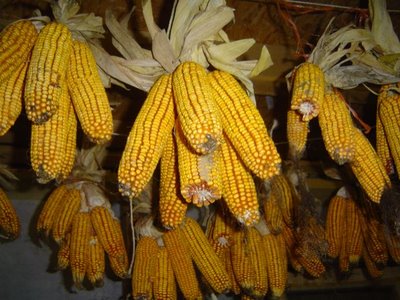
“And when ye reap the harvest of your land, thou shalt not make clean riddance of the corners of thy field when thou reapest, neither shalt thou gather any gleaning of thy harvest: thou shalt leave them unto the poor, and to the stranger…” (Leviticus 23:22, The Bible [KJV]) The verb “to glean” appropriately (for we are in Brittany!) comes from the Old French glener and means, in our country context, to gather grain left by the harvesters and, as shown by the quote above, it’s usually been associated with poverty. Patrick Whitefield, in suggesting a permaculture link suggests that if chickens are “let into the wheat field after harvest they will eat up the ears and grains that are missed in harvesting. We humans are not going to pick them up unless we go back to the drudgery of former years, when country people were so poor they were glad of the “gleanings”. Here the chickens are making use of a resource that would otherwise go to waste." Permaculture in a Nutshell pp10-11.
You’ll see from my blog of 25th September that I helped one of our neighbours out with the maize harvest. For the cows, the maize is chopped up—stalks, leaves and all—and they eat the lot. Paul’s a pig farmer, and for them, just the cobs are harvested, the stalks and leaves being shredded and ejected out the back of the combine harvester. Despite the computer age technology, many corn cobs are left on the field and, due to the scale of the operation (29 hectares [71 acres] in two days) there’s no way that the farmer can clean up afterwards, so they’ll just rot in the field. Knowing we keep chickens, Paul suggested that we could spend some time “gleaning” in his fields. Gabrielle went one time and came back all enthused. She took some help along next time, neighbour Carol, who’s also (just) got chickens, Carol’s daughter Emily and her friend Ann. They came back with a boot-load; Ann took to it so well, she said, “I love doing this” and then suggested that she could see herself marrying a farmer.
Permaculture is about inputs and outputs: making sure that the outputs of one part of a designed system become the inputs of another. Our gleaning is just using somebody else’s outputs as an input into our chicken enterprise. And far from the drudgery suggested by Patrick, it’s been, for us, a pleasant excuse to leave other tasks and go for a walk in a field in the sun with friends. Gabrielle made several forays and took Annike, our seventy-something old neighbour and her dog, Hugo, on one trip: Annike has an uncertain quantity of chickens, bantams and rabbits to feed. So, if, as Mark Twain once claimed, “Golf is a good walk spoiled”, might gleaning be having a renaissance as “an excuse for a good walk”? As part of my research for this blog, I came across a French film by Agnès Varda, The Gleaners and I [Les Glaneurs] which is described as a “marvellous film about gleaning as a philosophy - [which] is surprisingly beautiful and uplifting”, which we’ve ordered and are looking forward to viewing soon.
